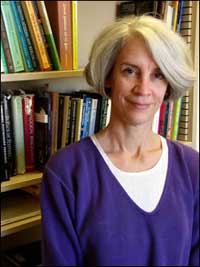This morning a colleague and I presented a reading report on feminism and postmodernist approaches to doctrine. We were given the challenge of presenting the insights of Mary McClintock Fulkerson as outlined in her chapter in the Cambridge Guide to Postmodern Theology, edited by Kevin J. Vanhoozer.
 Mary’s an academic theologian based at Duke Divinity School, Duke University, in Durham, North Carolina. She’s known for her 1994 book, “Changing the Subject: Women’s Discourses and Feminist Theology” in which she explores the complexity of recent studies on the experiences of women. Of particular interest to me were her reflections on the differences between Presbyterian and Pentecostal women. Her next book, “Traces of Redemption: Theology for Worldly Church”, will focus on doctrine of the church in light of racial diversity and differently abled.” She’s a minister with the Presbyterian Church (USA).
Mary’s an academic theologian based at Duke Divinity School, Duke University, in Durham, North Carolina. She’s known for her 1994 book, “Changing the Subject: Women’s Discourses and Feminist Theology” in which she explores the complexity of recent studies on the experiences of women. Of particular interest to me were her reflections on the differences between Presbyterian and Pentecostal women. Her next book, “Traces of Redemption: Theology for Worldly Church”, will focus on doctrine of the church in light of racial diversity and differently abled.” She’s a minister with the Presbyterian Church (USA).
Not only is Mary an academic. She’s also a partner in the establishment of Third Reconstruction Institutes in which academics and grass roots activists continue the work of the civil rights movement in the United States.
As a class we were looking for ways in which Mary’s work critiques the limitations of modernism.
At the beginning McClintock Fulkerson makes it very clear that feminist theology began and continues with a liberation hermeneutic. In many ways feminism has been its own form of postmodernism. She recognises that the ‘mainstream’ of feminism has been dominated by white Euro-American middle class women and has overlooked or attempted to assimilate the voices of those calling themselves womanist (African American) and Mujerista (Hispanic). And then of course the voices of Asian Americans, women in Africa and Asia, the voices of lesbian feminists. McClintock Fulkerson is clear that she speaks as a white middle class academic woman.
Mary chooses three themes from postmodernism that resonate with the liberation hermeneutic of recent feminist theology:
1. Instability of the subject.
2. The Unsayable
3. Liberative Implications
Mary points out that early feminism, in its critique of male-dominated society, often called for or attempted to describe a ‘unified natural woman subject’. Likewise the choice of sexism as the primary sin has flattened the differences and oppressions linked with racism, class exploitation and heterosexism.
Postmodernist feminist theologians have critiqued the capacity for anyone to categorise and describe the experience of women without reference to broader experiences. Foucault’s poststructural work reminds us that signifying does not refer to a fixed, external reality. The experiences of both women and men continue to be transformed by relational experience.
Finally Mary refers to the growing edge of feminist theology as it engages with a vision of liberation that goes beyond gender and explores economic and political transformation.

i was just saying to someone today that i think the emerging church conversation could learn so much from feminist theology – both from the (multiple) perspectives it offers on theology and ecclesiology, and also from the way it’s had to learn to listen to the hard to hear voices. i’m going out to buy this book… thanks for the tip!